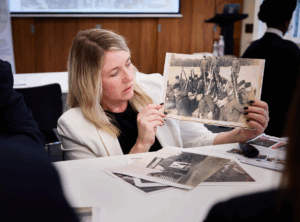Featured on BBC News website 13 September 2021
New research for the UCL Centre for Holocaust Education reports improved subject knowledge among those teaching about the Holocaust in English secondary schools over the last ten years. However, the same data also raises concerns. Notwithstanding these improvements, many teachers still appear to share a number of widespread misunderstandings, enduring misconceptions and common historical inaccuracies all of which have potentially profound consequence for the teaching and learning of this important history.
More encouragingly, the research also provides compelling evidence of a strong relationship between continuing professional development (CPD) for teachers and secure subject knowledge. This relationship is especially pronounced where such support meets or exceeds the Department for Education’s current Standards for teacher professional development as exemplified by the UCL Centre for Holocaust Education’s flagship Beacon School Programme.
Summary: Continuity and Change research study, Data Release 2
Although the Holocaust has featured as a compulsory component of the national curriculum at secondary level since 1991, previous research conducted by the UCL Centre for Holocaust Education warned of important limitations in the subject knowledge and understanding of both school students (in 2016) and their teachers (in 2009). As commentators from the Centre have argued, this likely reflects the deep-rooted and enduring nature of several widespread myths and misconceptions surrounding what might otherwise be assumed to be a ‘well known’ and very familiar history (Foster et al. 2016, Pettigrew et al. 2009).
Encouragingly, the Centre’s most recent research with teachers suggests that, over the last ten years, knowledge levels have improved overall. However, the survey responses given by almost 1,000 teachers who had recently taught about the Holocaust in 2019 and 2020 suggest that a number of significant gaps and common confusions remain. For example:
- fewer than half of all teachers were able to correctly identify that Jews comprised less than 1% of the pre-war population of Germany, or,
- that the systematic mass murder of Jewish people began with the invasion of the Soviet Union in 1941.
The research also makes a clear case for the value of sustained, collaborative and evidence-led programmes of specialist CPD in directly addressing misconceptions such as these. In 2009, the majority of those teaching about the Holocaust had received no specialist training in this area but the provision of support for teachers has expanded significantly over the last ten years, not least with the establishment of the Centre’s own programme of free courses which have been attended by almost 22,000 participants since late 2009. By 2020, 62.9% of teachers who completed the survey had taken part in specialist training with an external organisation and 48.3.% received input on teaching this history within their Initial Teacher Training Year. However, almost one fifth of those with recent experience of teaching about the Holocaust had received no formal specialist training at all.
Across all the knowledge questions asked in the 2019/20 survey, the experience of any formal specialist training on teaching about the Holocaust was associated with greater historical accuracy and for some forms of CPD, this relationship was especially pronounced. The best available international research evidence and the Department for Education’s own Standards for Teacher’ Professional Development emphasise that CPD is most effective when it: has a focus on improving and evaluating pupil outcomes; is underpinned by robust evidence and expertise; includes collaboration and expert challenge; is sustained over time; and is prioritised by school leadership (DfE 2016; Cordingly et al. 2015). The UCL Centre for Holocaust Education’s flagship Beacon School programme exemplifies all these attributes and across all questions, teachers’ who had participated in this programme demonstrated the highest levels of historical accuracy. In some cases these teachers were almost two times as likely to answer a question correctly as those who had taken part in other forms of CPD and up to four times more likely than those who had received no specialist training at all. Crucially, a clear majority of Beacon School teachers answered all of the knowledge-based survey questions correctly while this was not true of all forms of CPD.



